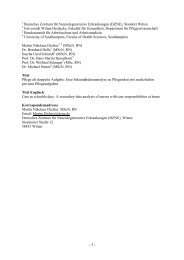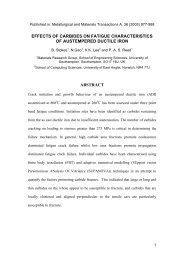Download (3398Kb) - ePrints Soton - University of Southampton
Download (3398Kb) - ePrints Soton - University of Southampton
Download (3398Kb) - ePrints Soton - University of Southampton
You also want an ePaper? Increase the reach of your titles
YUMPU automatically turns print PDFs into web optimized ePapers that Google loves.
Percentage <strong>of</strong> individuals swimming after 24 h<br />
1 1 0<br />
1 0 0<br />
9 0<br />
8 0<br />
7 0<br />
6 0<br />
5 0<br />
4 0<br />
1 0 0<br />
8 0<br />
6 0<br />
4 0<br />
1 0 0<br />
8 0<br />
6 0<br />
4 0<br />
1 0 0<br />
5 o C<br />
1 0 o C<br />
1 5 o C<br />
8 0<br />
6 0<br />
4 0<br />
2 0 o C<br />
0 5 0 1 0 0 1 5 0 2 0 0 2 5 0<br />
P r e s s u r e i n a t m<br />
Fig. 3.17. Marthasterias glacialis survival <strong>of</strong> swimming bipinnaria at 5, 10, 15 and<br />
20°C at 1, 50, 100, 150 and 200 atm for 24 h. Data are mean and SD <strong>of</strong> 3 replicates.<br />
Comparison <strong>of</strong> A. rubens and M. glacialis data with those <strong>of</strong> shallow water<br />
and deep-sea Atlantic echinoids suggests that the early embryos <strong>of</strong> echinoids are more<br />
tolerant <strong>of</strong> pressure/temperature changes but that the later larval stages <strong>of</strong> asteroids<br />
tolerate change more readily than the larval stages <strong>of</strong> echinoids.<br />
There is increasing evidence for accelerated deep-water formation at the end<br />
<strong>of</strong> glacial periods (Knorr & Lohmann, 2003). During deglaciation, the Atlantic<br />
thermohaline circulation becomes more vigorous changing from a weak glacial mode<br />
into a strong interglacial mode. There is also recent evidence that there may be a<br />
variety <strong>of</strong> sites <strong>of</strong> deep-water formation in the N. Atlantic (Pickart et al., 2003). If this<br />
more vigorous formation <strong>of</strong> deep water occurs at this transition period it may be that<br />
the warming <strong>of</strong> surface waters stimulates accelerated reproduction, both through<br />
68
















